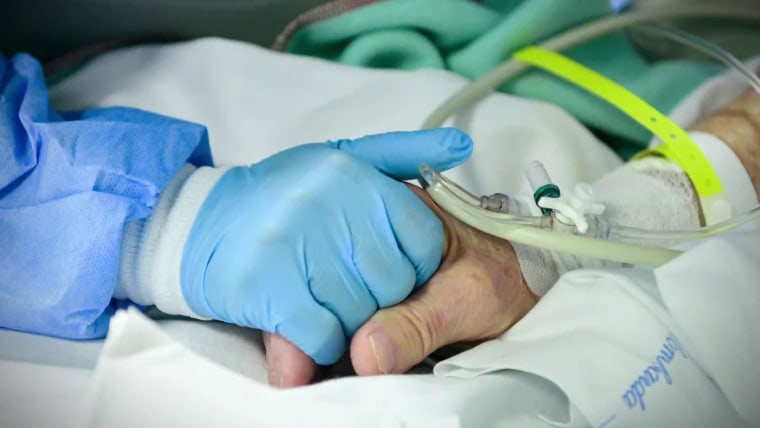GLASGOW — From Downton Abbey to Game of Thrones, Star Wars and Batman, their artistry has enthralled millions. But now a group of British costume designers are fulfilling an altogether different public service: making scrubs for medics on the front line of the coronavirus fight.
Working from makeshift studios in homes across the country, hundreds of people from the arts are plugging the gaps in overburdened supply chains, churning out high-quality clinical attire for the doctors and nurses battling COVID-19, the disease caused by the virus.
The initiative — dubbed #HelpingDressMedics by organizer Dulcie Scott — started as a small-scale operation.
“I thought: ‘There’ll be about 10 of us; we’ll make some scrubs and that’ll be it.’ I got my credit card out and bought 850 worth of fabric,” Scott told NBC News.
To cover the cost of the material, the group started a GoFundMe page, hoping to raise 1,500 pounds ($1,865). That was a Friday night in late March, she said, and “by Sunday we had 8,500.”
Three weeks later, donations have surpassed 50,000 pounds ($62,000). The team has grown massively, too — 150 eager volunteers across Britain are in the process of delivering 6,500 sets of scrubs.
Tara Parker, a pediatric nurse in Birmingham, was an early beneficiary of the program. Like thousands of others, she chose to return to medicine in light of the crisis, but struggled to find appropriate attire through official channels.
Let our news meet your inbox. The news and stories that matters, delivered weekday mornings.
“They told me, ‘Just wear whatever you’ve got.’ But I didn’t have any [scrubs]. When you leave hospitals nowadays, you have to give them back, and if you don’t, you get fined,” she said.
As a senior practitioner, Tara would typically have worn her own clothes at work; but the rigors of coronavirus care make that impossible, she soon realized.
“You need to be wearing personal protective equipment over the top, so it’s boiling hot. And you need stuff that can come home and be washed at 60 degrees to kill the infection.”
And so, desperate to get properly equipped, Tara contacted the team at #HelpingDressMedics. Within days, she had the scrubs she needed and was back at work in a children’s emergency department.
The health service’s chronic lack of equipment extends beyond clothing, however. PPE is in desperately short supply in British hospitals — especially full-face visors.
Alerted to the shortfall, Michael van Kesteren — a prop designer who worked with Dulcie Scott on the BBC/HBO drama His Dark Materials — started producing visors at home with a 3D printer.
“I’d heard stories of nurses here in the U.K. having to wear freezer bags over their heads with breathing holes poked in them,” Kesteren, who is based in Wales, said.
“People who are on the front line need this protective gear and they’re just not getting it, regardless of what the government’s saying,” he added.
His printer, though small, is accustomed to creating intricate TV props, and can crank out 16 visors a day. He has supplied local health care professionals with 70 so far, and has a similar-size batch ready to go. And he’s not alone. “Most people that I know in the industry that have 3D printers [are making PPE],” he said.
Still, such is the scale of the COVID-19 catastrophe, more visors are needed. To scale up his output, Kesteren has ordered a second printer with donated funds, and hopes soon to be making 40 a day.
This work ethic is echoed across the U.K. creative industry, Scott said.
“In our jobs, we’re used to hitting the ground running, looking around and going, ‘Right, what can I do?’ Working as a team, problem solving, and having to think on your feet.”
But for all their resourcefulness, the #HelpingDressMedics team is reliant on charitable donations, which, regrettably, “have started to plateau in recent days,” she said.
“The money that has been raised so far has already been committed to health care centers.”
“Until I know that there’s definitely going to be some more money coming through, I can’t promise any more scrubs.”
And so the group is again appealing for public donations — funds that will allow them to clothe even more “real life superheroes, unlike the fictional ones we’re used to working with.”












